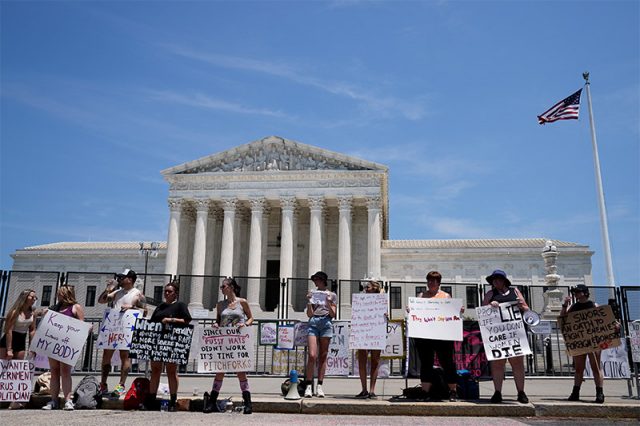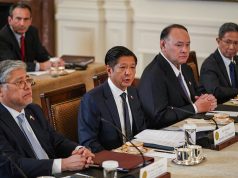
Most Google search queries in the Philippines on Saturday, June 25 were about the United States Supreme Court’s decision to reverse Roe vs Wade, which removed US citizens’ constitutional right to abortion after nearly half a century.
Based on Google Trends data, Filipinos recorded at least 50,000 search queries on Saturday about Roe vs Wade — overtaking “Money Heist Korean,” which was second most searched, and “Lolong,” which became the fourth searched topic after photos of a large animatronic crocodile in Metro Manila went viral.
Over the weekend, Filipinos continued to search about the ruling, based on Google Trends data.
Google Trends aggregates people’s activity on the search engine to measure interest in particular topics at a local level over a period of time.
Filipinos who searched about Roe v. Wade also searched for “abortion” and “legal case.”
Roe vs. Wade refers to the lawsuit that led to the landmark 1973 U.S. Supreme Court decision establishing women’s constitutional right to terminate their pregnancy by abortion. Specifically, the majority opinion found an absolute right to an abortion during the first trimester of pregnancy.
That has been reversed with a 5-4 ruling by the U.S. Supreme Court’s conservative majority, deciding that the Constitution does not protect the right to abortion.
Philippine context of abortion
If tech-savvy Filipinos’ Google search habits are any indication, the U.S. court’s restriction of women’s reproductive rights must have rung a bell in a country where abortion laws are among the strictest in the world.
RELATED: U.S. Supreme Court overturns Roe v. Wade, ends constitutional right to abortion
Despite being punishable with imprisonment, the practice of abortion remains widespread, with some women resorting to “back-alley” abortions from non-licensed individuals, or taking drugs and herbal concoctions to avoid unplanned births, according to a study in 2005.
The study also linked increasing incidences of induced abortions to women’s difficulty in accessing modern contraceptives and health care.
US journalist Vittoria Elliott, who previously wrote about unsafe abortions in the Philippines, said in a Twitter thread that the Philippines is “a good litmus test” for how women respond to a lack of legal avenues for abortion.
“Through social media and anonymous forums, women buy pills, shipped to them in disguised containers, and self-administer abortions, because there are no other options. It’s an open secret,” Elliott said.
Orthopedic surgeon Robbie Meriales also recounted in a series of tweets that women, often single and low-income, subjected themselves to dangerous methods to terminate their pregnancies.
“At the hospital, we often see the woman with a thready racing pulse, with lower abdominal pain, and foul-smelling bloody vaginal discharge. The fetus is almost always dead. The woman is septic. And will probably die if doctors don’t act fast,” Meriales added.
User @bobnelsonhuman also tweeted that “discourse in the Philippines on abortion is tough” because adoption is often touted as an alternative despite Filipinos’ contrasting views on blood relations.
Lawyer Oliver Reyes, a lecturer at the University of the Philippines College of Law, tweeted a poll asking his followers: “Do you personally know anyone in the Philippines who has had an abortion?” to determine the abortion cases in the country.
The unofficial Twitter poll yielded 2,163 votes. Of which, 53.5% of the respondents voted “Yes, but an illegal one,” followed by the “I suspect I do” response with 26.7% votes.
At least 16% of the respondents said they do not know anyone who had an abortion while 3.9% said they know an individual who had an abortion overseas.
Do you personally know anyone in the Philippines who has had an abortion?
— oli r. (@ohlistic) June 24, 2022
President-elect Marcos’ previous abortion stance
President-elect Ferdinand Marcos Jr. said in an interview with TV host Boy Abunda in January that he is open to enacting a law to make abortion legal for victims of sexual crimes.
Marcos added that women who get pregnant due to rape should have the choice to abort or not, and victims of incestual rape should have access to safe abortion.
“The bottom line is, when it comes to the subject of abortion, it is a woman’s decision because it is her body,” Marcos added.
The Philippine Safe Abortion Advocacy Network previously called on the incoming administration to decriminalize abortion in the Philippines to avoid “thousands of preventable deaths” due to lack of access to health care.









